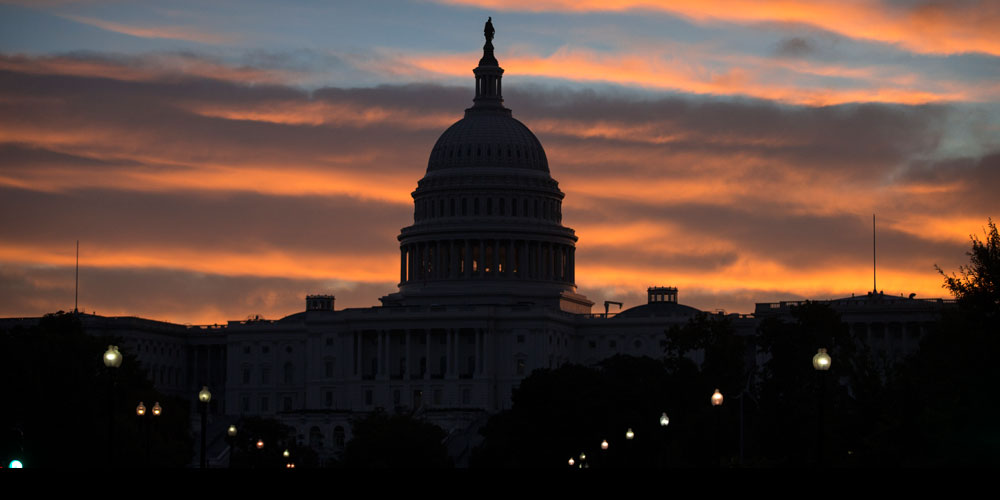US stocks sink as government heads toward shutdown

The morning sun illuminates the US Capitol in Washington, Monday, Sept. 30, 2013, as the government teeters on the brink of a partial shutdown at midnight unless Congress can reach an agreement on funding. US stocks sank Monday as Wall Street worried that a budget fight in Washington could lead to an event far worse for the economy—a failure to raise the nation’s borrowing limit. AP PHOTO/J. SCOTT APPLEWHITE
NEW YORK—US stocks sank Monday as Wall Street worried that a budget fight in Washington could lead to an event far worse for the economy—a failure to raise the nation’s borrowing limit.
Investors pulled back from stocks as a budget fight in Congress threatened to push the government into a partial shutdown for the first time in 17 years. Lawmakers have until midnight Tuesday to reach a budget deal that would keep government in full operation.
There is a simple reason why the budget battle—and, more importantly, an upcoming fight over the debt ceiling—are so crucial: the credit of the United States is the bedrock that nearly every other investment is built upon, largely due to the assumption that the nation will always pay its debts.
“The concern is government has become so polarized that if it cannot pass (a budget), there’s a greater chance that the debt ceiling battle will go to the brink or possibly lead to a default,” said Alec Young, global equity strategist with S&P Capital IQ.
The Dow Jones industrial average fell 129 points, or 0.8 percent, to close at 15,129.67. The Standard & Poor’s 500 slid 10 points, or 0.6 percent, to 1,681.55 and the Nasdaq composite dropped 10 points, or 0.3 percent, to 3,771.48.
Article continues after this advertisementMonday’s decline adds to what has been eventful September for investors. Stocks hit an all-time on Sept. 18 after the Federal Reserve voted to keep up its economic stimulus program. But that enthusiasm vanished as Wall Street began to worry that the political bickering between Democrats and Republicans would lead to a government shutdown and crisis over the debt ceiling.
Article continues after this advertisementA partial government shutdown is all but certain. Congress and the White House were no closer to a budget deal Monday afternoon.
If no deal is reached by midnight Tuesday, the federal government will partially shut down for the first time in 17 years.
What shutdown could mean
A brief shutdown wouldn’t hit the economy and stock market that hard. But a shutdown lasting two weeks could slice 0.3 percent points off US gross domestic product, according to a report by Macroeconomic Advisers. That is because hundreds of thousands of federal workers will go without a paycheck.
“You’re putting a lot of people, at least temporarily, out of work and out of pay, and that will affect spending,” said Kathy Jones, vice president of fixed income strategy at Charles Schwab. “It slows down activity on companies that depend on federal contracts.”
Some investors think a shutdown may be a positive event in the long term. The political pressure from a shutdown could force politicians to get down to business and negotiate—particularly on the issue of the debt ceiling.
“This may be good thing in the long run because it may lead to compromise,” said J.J. Kinahan, chief strategist at TD Ameritrade.
Treasury Secretary Jack Lew said last week that the government would run out of borrowing authority by roughly Oct. 17. The last time the debt ceiling issue came up in August 2011, it led to Standard & Poor’s downgrading the United States’ credit rating and the Dow went through nearly three weeks of nauseating triple-digits moves almost daily.
“This sort of political brinkmanship is the dominant reason (the United States’ credit) rating is no longer ‘AAA,'” Standard & Poor’s analysts Marie Cavanaugh and John Chambers wrote in a note to investors Monday.
If domestic and foreign investors begin to question whether the US will pay its debts, it could throw every other investment out of alignment.
“It’s a threat to the center of the global financial system,” said Jake Lowery, portfolio manager at ING U.S. Investment Management.—Ken Sweet with Steve Rothwell in New York